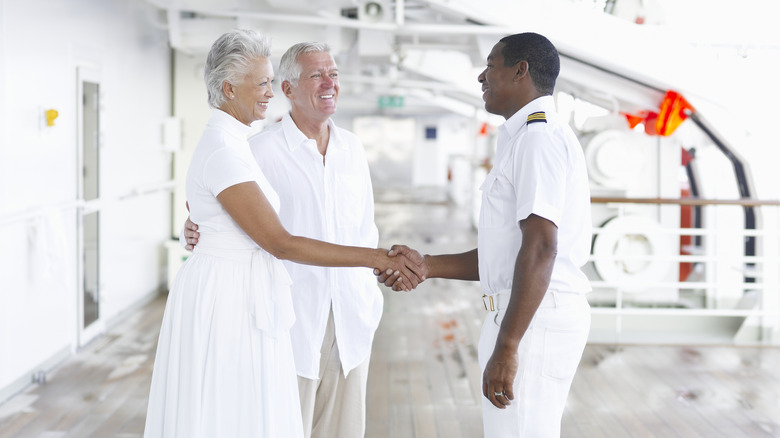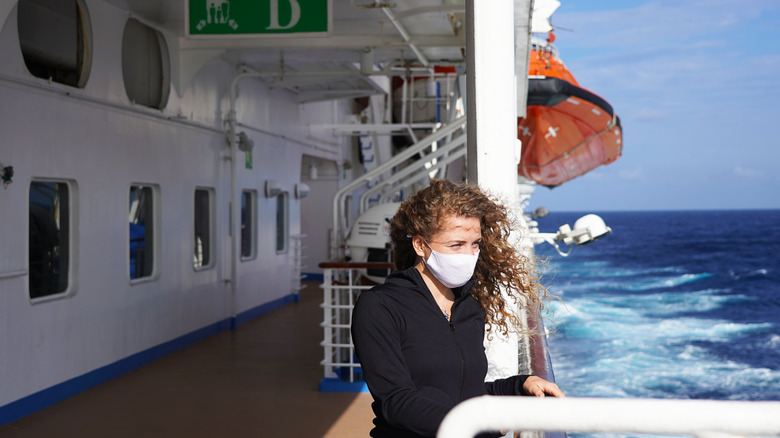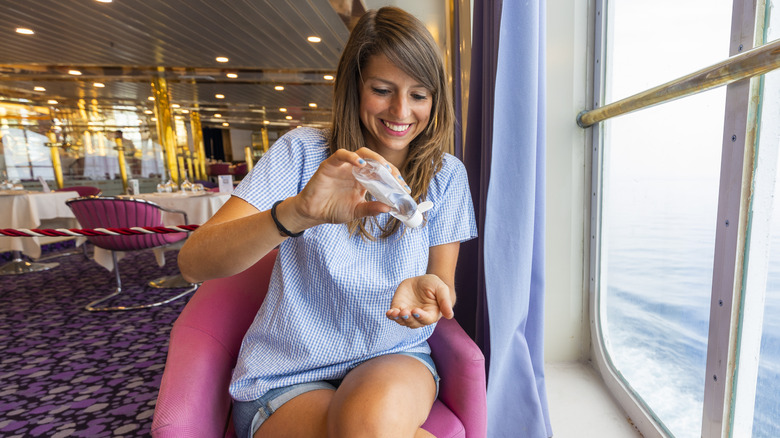Why Cruisers Are Often Discouraged From Shaking Hands With The Captain
Just like on planes or behind the wheel of a car, cruise ships have rules passengers must follow. Some are obvious, like not bringing illegal substances or weapons on board. Others are a little less expected. For instance, fishing off your balcony could get you banned from cruise ships for life. And sometimes, even seemingly positive behaviors should be avoided during a cruise. Case in point: You should never shake hands with the captain.
Being friendly and showing appreciation to the cruise captain is always a good thing, but you might want to keep your hands to yourself when saying hello. As YouTube creators Ben and David, who run the popular channels Cruise with Ben and David and InsideCruise, shared exclusively with Explore that some cruise lines discourage shaking hands with the captain to help prevent the spread of illness. "We think it's a sensible idea, especially considering how many guests the captain meets during each voyage," the pair explained. "Avoiding direct contact helps reduce the risk of germs spreading, and on a cruise ship, it's always better to be safe than sorry!"
However, don't be shocked if you do see a cruise captain shaking hands and mingling with guests. Ben and David noted that policies and norms vary depending on the cruise line, as well as the captain's preferences. "Some captains really enjoy that personal connection, while others may be more cautious."
How common are contagious illnesses on cruise ships?
It's not rare to hear of a virus spreading through a cruise ship. In early 2024, a mysterious illness took over the cruise ship Queen Victoria, resulting in gastrointestinal symptoms. And at the beginning of the COVID-19 pandemic, passengers on board the Diamond Princess were quarantined for nearly a month at a Yokohama port to prevent the spread of the deadly virus.
Despite these stories, Ben and David suggest that cruise ships aren't unique when it comes to germs. "While being on a cruise ship doesn't automatically make you more likely to catch something, it's similar to any place where large groups gather, like airports, concerts, or resorts. On a ship, there are lots of shared spaces such as restaurants, pools, and theatres, which means germs can spread more easily." The pro cruisers added that, based on their observations, cruise lines tend to prioritize hygiene and sanitation more than other types of travel companies. "So while the risk is there, cruise ships are generally very well-prepared to manage it."
Even if there's free-flowing hand sanitizer and regular wipe-downs of tables and doorknobs, your captain may still decide against shaking hands. After all, they have a critical duty to uphold. With that said, there are always other deck crew members available to assume command if needed.
Other ways to prevent the spread of illness
Keeping your hands stuffed in your pockets, away from other people and surfaces, isn't realistic when spending days or even weeks on a ship. So what can you do to protect yourself and prevent the spread of illness? Ben and David have a few practical tips they've learned throughout their years of cruising.
First, do what you can to keep your hands clean. "We always make sure to wash our hands before meals and after touching shared surfaces like handrails or lift buttons. It really makes a difference!" the YouTubers shared. Hand sanitizer is a convenient alternative when you're not near a sink. "Cruise ships have hand sanitizer stations all over the place, and we always make the most of them. Plus, we carry a small bottle with us wherever we go." The duo always sanitize before getting food at the buffet and before eating.
Another piece of advice, courtesy of Ben and David: Don't cruise if you think you might be sick. "We know how disappointing it can be to miss out, but boarding the ship when you're sick can put both you and fellow passengers at risk," they explained. If you don't realize you've fallen ill until after you've started the voyage, be sure to visit the on-board clinic. Buying travel insurance can help cover the cost of any unexpected treatments or doctor's visits on the ship.


